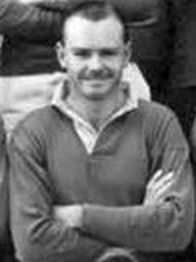Back to search results
Name: MacGREGOR, Duncan Patrick Butler

Photo Source: William Cherry
Nee: son of Robert Morrice and Carmel Macgregor
Birth Date: 22 July 1924 Durban, S. Africa
Death Date: 25 Nov 1998 Hothorpe, Lutterworth, England
First Date: 1924
Last Date: 1961
Profession: Motor trader, Director MacGregor-Oates Motors Ltd.
Area: Nairobi
Married: In Nairobi 14 June 1952 Irene Hazel Kempton Grimbeck b. 10 Oct 1929 Bournemouth, d. 19 May 2019 Marston Trussell, Northants. (dau of John Wilfred Grimbeck and stepdau of Frederick Albert Kempton)
Children: Bridget Ingrid (Scurfield) (11 June 1954 Nairobi-21 Aug 2016 Northants.); Barbara; Fiona; Robert Duncan
Book Reference: EAWL, Buffalo Barua 2, Web
War Service: EA Artillery 1942-46, Gunner to Captain
School: Nairobi Primary School, Prince of Wales School, Nairobi
General Information:
Buffalo Barua 2 - letter from Hammy O'Hara - ' … I remember him best as Captain of the Old Cambrians rugby team. I was one of the younger members of the team and had the honour of playing under Duncan's captaincy - minus his two front teeth ….'
Extract from a 'Tribute to my Father' by Robert Duncan Macgregor, given at his funeral at St. Mary's, Husbands Bosworth, 30th November 1998 "Duncan Macgregor chose to guide by example rather than precept, by actions rather than words. And while he held himself to the highest personal standards, he was also indulgent of others weaknesses; he was non-judgmental and quick to forgive. Another word that comes to mind is "service". He had an unerring sense of duty; to his family, to his friends, to his country and his church. As a boy in Kenya he disguised his age to serve his country in the Second World War. At just seventeen years old he joined the army seeing action in Madagascar and later against the Japanese in Burma. His former commanding officer, Sir Dan Petit spoke of how Duncan's mother asked him, on the ship, about to sail for India, to keep her son out of any trouble. In his words, Duncan, being Duncan of course, got into all the hot spots".
Always modest in his achievements, he would only recall those incidents almost incidental to the main business of war. For instance the story of the army dentist who had to operate a treadmill with his foot to power the drill he was using in Duncan's mouth at the same time. His public service continued after the war. He was asked to form and command Sp.. Company of the Kenya Police Reserve at the height of the Mau Mau. The work involved night time raids against known terrorist strongholds, supported by the British Army, was mentioned in despatches for his achievements. During this time he was also working in the family motor business by day and raising two infant daughters. Again he always played down his personal courage; his strong sense of duty was always worn lightly.
A fine sportsman, Duncan was above all a team player, a quality that he carried into all walks of life. He loved rugby and hockey but with a good eye for a ball he could turn his hand to most games.
Born in South Africa but raised in Kenya, Duncan was to the end unmistakably colonial. Thirty years in the United Kingdom did not diminish his desire to escape from time …………… a smattering of Swahili words in his everyday speech. A line in his father's obituary is applicable in equal measure to his son. Duncan preferred to "do good by stealth and blush to find it fame". And then there was a side to Duncan that was even more private than his quiet but considerable charity and this was his religious belief. Duncan used to joke about his mortality from his 70th birthday. He would quote the Bible passage that says that three score and ten is a man's full allotment. He felt he had been given a special line of credit. In summary a simple pigraph seems most appropriate. " A good man, a good father, a good husband and a good friend. "
Back to search results

